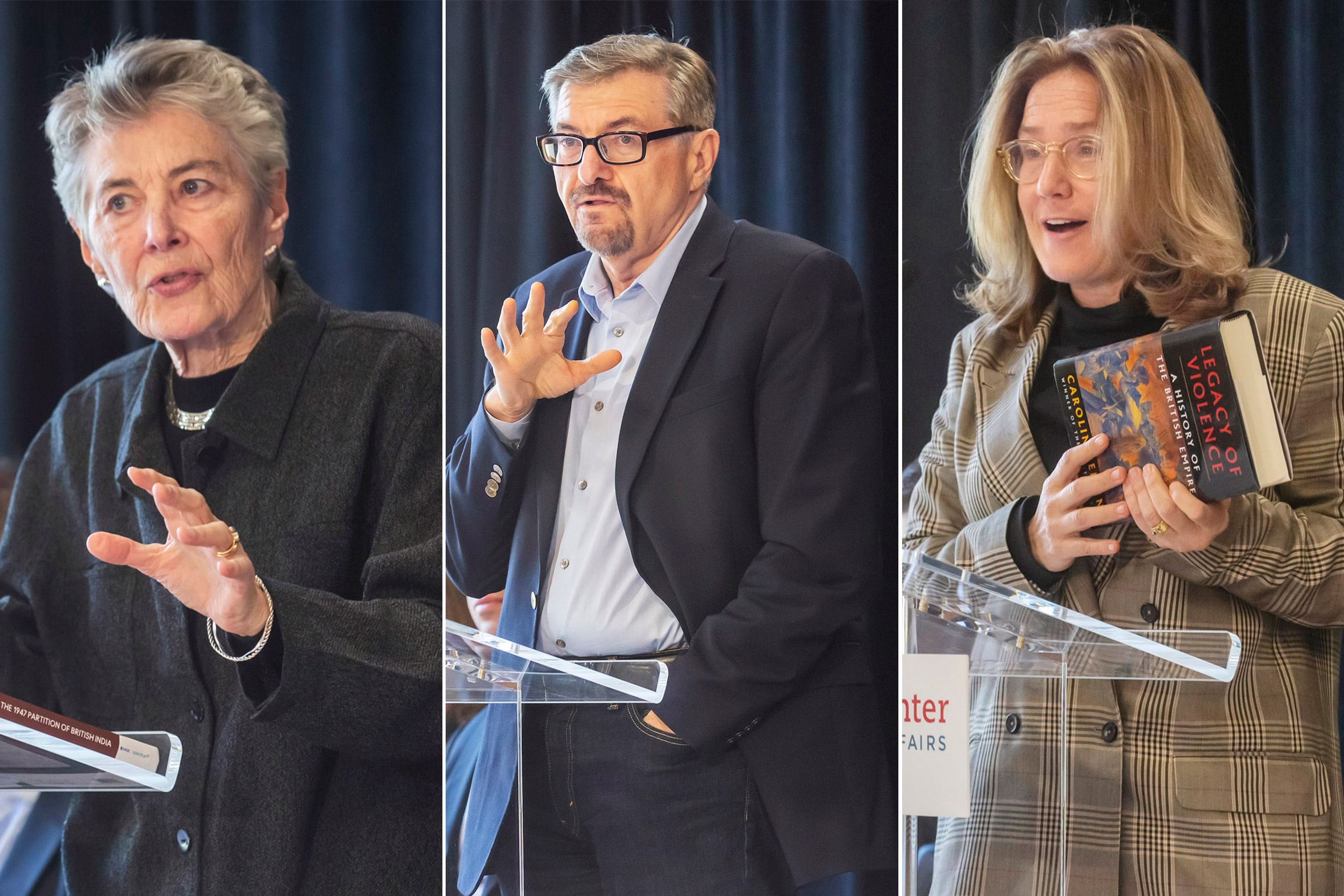
Professors Jennifer Leaning, Serhii Plokhy, and Caroline Elkins were three among eight writers and editors who had seven minutes to describe their work.
Photos by Jon Chase/Harvard Staff Photographer
The snappy book talk: ‘When does that happen in academia?’
Scholars had seven minutes to explain their work to an audience. Some actually managed it.
Gathering Monday at the Center for Government and International Studies, a group of professors looked excited to talk about their books, if maybe a little wary of the clock.
Sponsored by the Weatherhead Center for International Affairs, the “book blitz” demanded that each author or editor describe his or her work in seven minutes or less. When time was up, a bell signaled that it was time to stop talking. The event was a chance for associates of the center to promote their work in an informal setting, and a hit with both the audience and the eight speakers, even if only two managed to beat the bell.
“I enjoyed the format quite a bit and the snappiness of the presentations,” Dustin Tingley, a professor of government, said with a chuckle. “When does that happen in academia?”
Tingley discussed “Uncertain Futures: How to Unlock the Climate Impasse,” which he co-wrote with Alexander Gazmararian. The book features voices on the front lines of the debate, including a commissioner in Carbon County, mayors and unions in Minnesota, and energy company executives and people in Appalachia.
It’s not surprising that academics love to talk about their books, considering how long they take to complete. Consider, for example, the Pulitzer Prize-winning historian Caroline Elkins, who compressed 15 years of work into a swift summary of her latest book, “Legacy of Violence: A History of the British Empire.”
Sarah Dryden-Peterson, an associate professor of education, talked about the research behind “Right Where We Belong: How Refugee Teachers and Students Are Changing the Future of Education,” which covers 15 years of “ethnographic observations across 23 countries and more than 600 interviews.” Her book, said Dryden-Peterson, aims to draw attention to the fact that half of the world’s 26 million refugees are children.
Among other featured speakers were the sociologist Frank Dobbin, who co-wrote, with Alexandra Kalev, “Getting to Diversity: What Works and What Doesn’t”; the health scholar Jennifer Leaning, who co-edited, with Shubhangi Bhadada, “The 1947 Partition of British India: Forced Migration and Its Reverberations,” and the historian Serhii Plokhii, who discussed “Atoms and Ashes: A Global History of Nuclear Disasters.” Plokhii warned the audience about the possibility of future nuclear accidents.
“What do I think about the future of the nuclear industry, as a result of doing this research?” he said. “One thing is that I am sure that there will be accidents in the future. With each new accident, there is a learning curve, but each new accident comes from the place where we didn’t expect it to come.”
When it was his turn, the historian Charles S. Maier, author of “The Project-State and Its Rivals: A New History of the Twentieth and Twenty-First Centuries,” said he was going to need only seven minutes.
“We always like to talk more than the time we are given,” said Maier, with a playful smile, after the talk. “There was a lot to remember, but everybody was constrained to speak and get to the point.”
For the Business School’s Jeremy Friedman, who finished his discussion of “Ripe for Revolution: Building Socialism in the Third World” with 20 seconds to spare, the event was challenging but fun. He had practiced his seven-minute speech a couple of times, he admitted. But even more powerful was his geographical advantage.
“I talk really fast,” Friedman said. “I’m from New York.”




